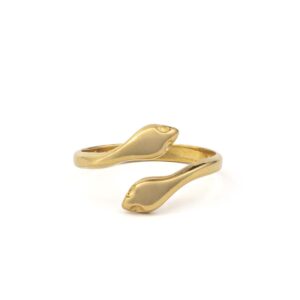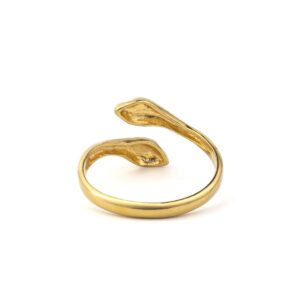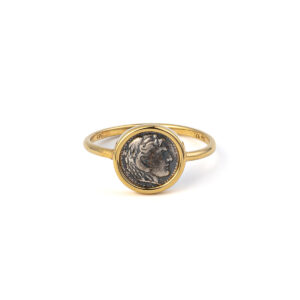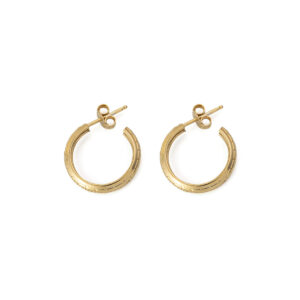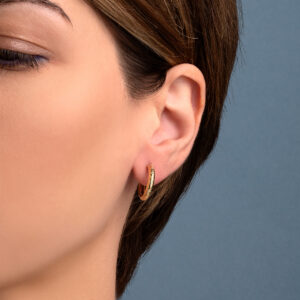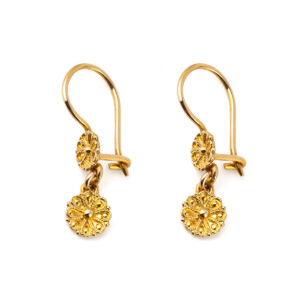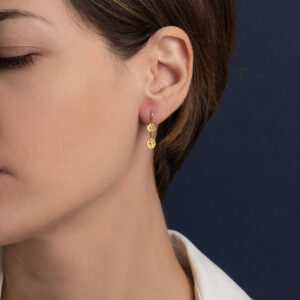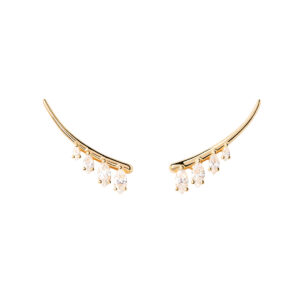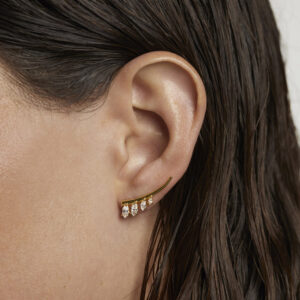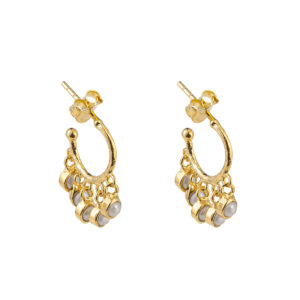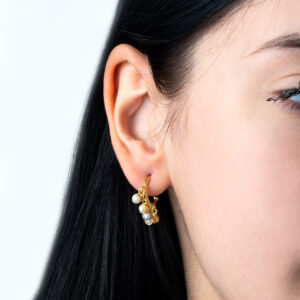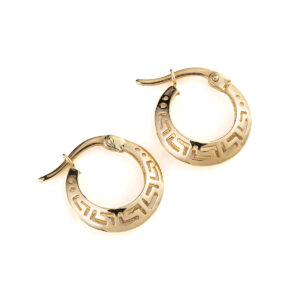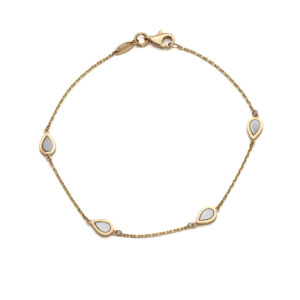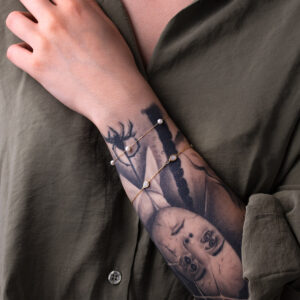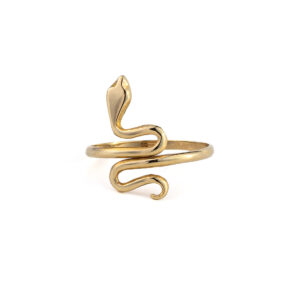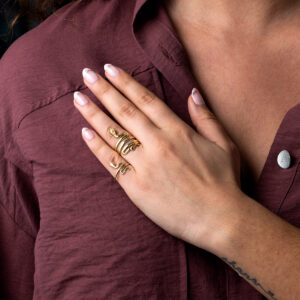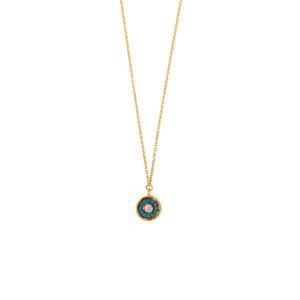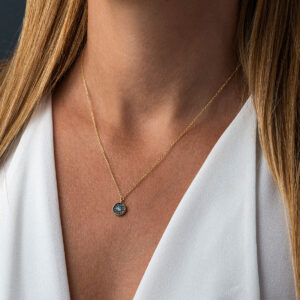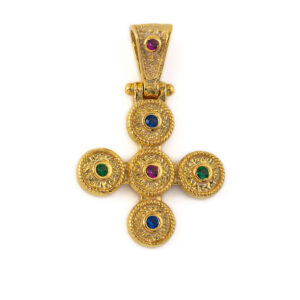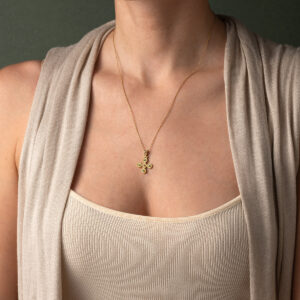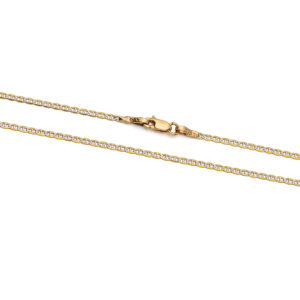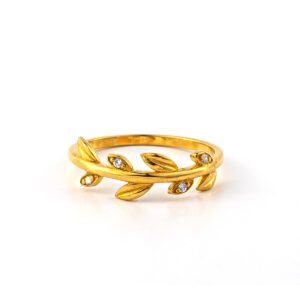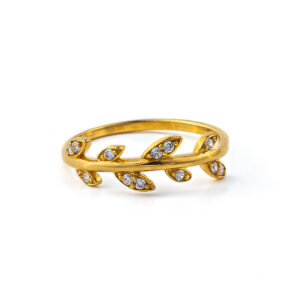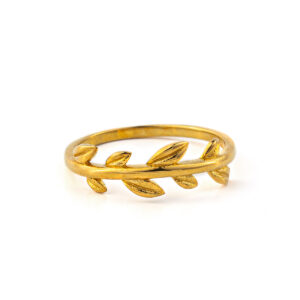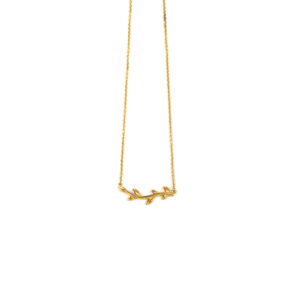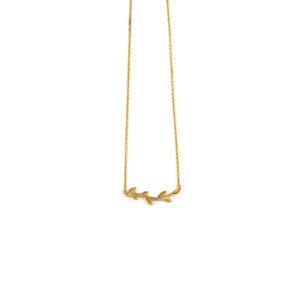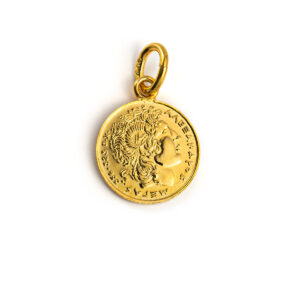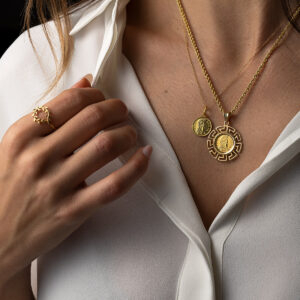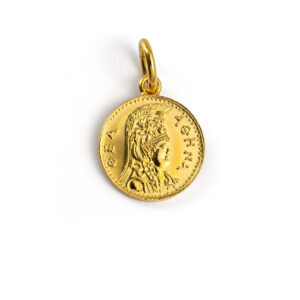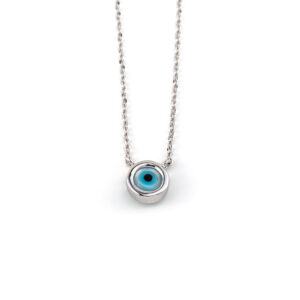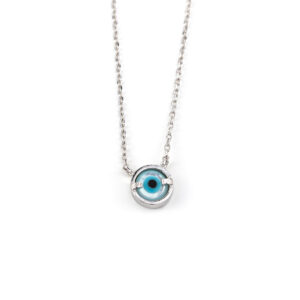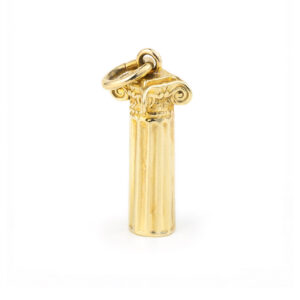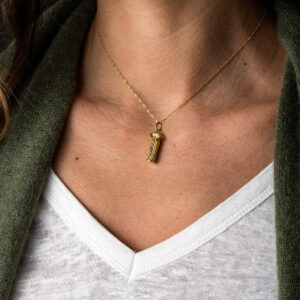Double Snake Ring – 925 Sterling Silver and Gold Plated
Made of sterling silver 925°.
Handmade in Greece
Explore SNAKE Collection
The snake is an ancient, cross-cultural symbol with a vast range of meanings. It can represent everything from evil and temptation to the universe, eternity, fertility, sexuality, wisdom, healing, and rejuvenation.
In ancient Greek mythology, snakes appear in numerous tales:
According to one legend, Ophion, the serpent, ruled the world until he was overthrown by Cronus and Rhea.
In the Minoan civilization, the Goddess with Snakes, depicted holding a snake in each hand, symbolized wisdom and fertility.
Asclepius, the Greek god of medicine, gained healing knowledge by observing snakes, and his rod, with a snake wrapped around it, continues to be the symbol of medicine today.
Across various cultures and traditions, the snake has remained a powerful symbol, transcending borders and time.
Hercules Ring – 14K Gold and Sterling Silver
Handmade ring inspired by the ancient Greek tetradrachm coin, depicting Hercules.
Made of 14k gold and 925° sterling silver.
Handmade item.
Explore Coins Collection
Hercules is a Roman hero and god, the most popular figure from ancient Greek mythology.
Meander Greek Key Hoop Earrings – 925 Sterling Silver and Gold Plated
Earrings inspired by the Greek Key meander symbol.
Made of sterling silver 925° and gold plated.
Explore Meandros Collection
History
Meandros design is a decorative border constructed from a continuous line, shaped into a repeated motif. Such a design is also called the Greek fret or Greek key design, although these are modern designations. On the one hand, the name “meander” recalls the twisting and turning path of the Meander River in Asia Minor, and on the other hand, as Karl Kerenyi pointed out, “the meander is the figure of a labyrinth in linear form” the meaning is that there is no beginning and no end in some cases so it becomes the symbol of long life and eternity.
18K Gold Byzantine Rosette Earrings
489,00€Byzantine earrings with the shape of a flower rosette.
Handmade with great attention to detail. Inspired by Byzantine art.
Made in 18k gold.
Handmade item.
Explore Byzantine Collection
Rosette flower
The rosette (rose) is a timeless jewel, symbol, and amulet. The origin of the term is the Greek word for rose – rodon (ρόδον). Its use began in the Mycenaean era and continues as far as the 2nd millennium BC. The Mycenaean Rosette is a motif that was widespread throughout Mesopotamia, Egypt, Greece, and other ancient civilizations. It is inspired by a Mycenaean rosette bead, found at Mycenae, dated to 1400-1300 B.C. The rosette was used extensively in ancient Greek Mycenaean jewels, in architecture, pottery, and sculptures from 1500 BC. Mycenaean rosettes usually had 6 or 8 or 12 leaves, and sixteen leaves during the Macedonian Dynasty. Such details as the rodax shape and the number of leaves tend to vary with the era or beliefs. The rosettes were used to decorate the clothes, belts, and wreaths of the Kings. The number of leaves had a symbolic character each time. The four elements of nature (wind, earth, fire, water), the seven wonders of the ancient world or the twelve gods of ancient Greeks, and the world domination and radiance of the Kings of Macedonia. They were signs of beauty, purity, eugenics, worship, and power. Rosette or Rodax was probably the most popular and favorite decorative element in Mycenaean era, classical antiquity and Byzantine times.
Blue Opal Band Ring – 925 Sterling Silver
Made of 925⁰ sterling silver with blue opal stone.
Handmade in Greece.
PD Paola Aqua Climbing Earrings
85,00€A REINVENTION OF THE BASICS
The Essentials embody refined effortlessness. Timeless staple hoops, studs or chain earrings with smooth lines that are perfect for everyday wear but can also work on special occasions by stacking them.
The Aqua Climbing earrings have four white fixed zirconia pendants in differents sizes, made with silver and 18K gold plating.
Pearls Hoop Earrings – Sterling Silver and Gold Plated
Made of 925⁰ sterling silver and gold plated.
Handmade in Greece
As in all handmade items there may be small differences in weight and dimensions and this is what makes them unique and precious.
The collection contains jewelry with unique semi precious stones in beautiful colors.
Explore Ionian Colors Collection
Gold 14K Meander Hoop Earrings
408,00€Made of 14K gold. Handmade in Greece
Explore Meandros Collection
Meandros design is a decorative border constructed from a continuous line, shaped into a repeated motif. Such a design is also called the Greek fret or Greek key design, although these are modern designations. On the one hand, the name “meander” recalls the twisting and turning path of the Meander River in Asia Minor, and on the other hand, as Karl Kerenyi pointed out, “the meander is the figure of a labyrinth in linear form” the meaning is that there is no beginning and no end in some cases so it becomes the symbol of long life and eternity.
Snake Ring – 14K Gold
404,00€Made in 14k gold.
Handmade item. As in all handmade items there may be small differences in weight and dimensions and this is what makes them unique and precious.
Round Evil Eye Necklace – 9K Gold
324,00€Made of 9K gold.
Handmade in Greece.
Explore Mati Collection
Evil Eye
The symbol and superstition of the evil eye is one of the strongest symbolic images in the world. The earliest known evidence for belief in the evil eye goes back to ancient Greece and Rome. It is supposed to wear off evil to anyone who wears it and various cultures believe in that, however in Greece it’s blue because at that time blue eyes were not so common and were thought to give the evil eye, so the blue is like a mirror to them.
Byzantine Cross with Zircon – 925 Sterling Silver Gold Plated
Made of 925⁰ sterling silver and gold plated.
Handmade item.
Leaf Zircon Ring – 14K Solid Yellow Gold
418,00€Ring inspired by the olive leaf symbol.
Made of 14k gold with zircon.
The olive wreath also known as kotinos was the prize for the winner at the ancient Olympic Games. It was an olive branch, of the wild- olive tree that grew at Olympia, intertwined to form a circle or a horse-shoe. According to Pausanias it was introduced by Heracles as a prize for the running race winner to honour his father Zeus. In the ancient Olympic Games there were no gold, silver, or bronze medals. There was only one winner per event, crowned with an olive wreath made of wild-olive leaves from a sacred tree near the temple of Zeus at Olympia. Olive wreaths were given out during the 2004 Summer Olympics in Athens in honor of the ancient tradition because the games were being held in Greece.
Leaf Ring with Zircon – 14K Solid Yellow Gold
418,00€Ring inspired by the olive leaf symbol.
Made of 14k gold with zircon.
The olive wreath also known as kotinos was the prize for the winner at the ancient Olympic Games. It was an olive branch, of the wild- olive tree that grew at Olympia, intertwined to form a circle or a horse-shoe. According to Pausanias it was introduced by Heracles as a prize for the running race winner to honour his father Zeus. In the ancient Olympic Games there were no gold, silver, or bronze medals. There was only one winner per event, crowned with an olive wreath made of wild-olive leaves from a sacred tree near the temple of Zeus at Olympia. Olive wreaths were given out during the 2004 Summer Olympics in Athens in honor of the ancient tradition because the games were being held in Greece.
Leaf Ring – 14K Solid Yellow Gold
395,00€Ring inspired by the olive leaf symbol.
Made of 14k gold.
The olive wreath also known as kotinos was the prize for the winner at the ancient Olympic Games. It was an olive branch, of the wild- olive tree that grew at Olympia, intertwined to form a circle or a horse-shoe. According to Pausanias it was introduced by Heracles as a prize for the running race winner to honour his father Zeus. In the ancient Olympic Games there were no gold, silver, or bronze medals. There was only one winner per event, crowned with an olive wreath made of wild-olive leaves from a sacred tree near the temple of Zeus at Olympia. Olive wreaths were given out during the 2004 Summer Olympics in Athens in honor of the ancient tradition because the games were being held in Greece.
Leaf Necklace – 14k Yellow Gold
408,00€Made in 14K gold.
A necklace inspired from the olive branch, a symbol of peace, abundance and achievement.
Handmade item.
Alexander the Great Coin Pendant – 14K Yellow Gold
408,00€Α beautiful and timeless Coin Pendant inspired by the ancient Greek tetradrachm coin of Alexander the Great. The back side is decorated with the Vergina symbol.
Made of 14k gold.
The chain shown is our 14K Gold Chain (not included)
Explore Coins Collection
History
This Ancient Greek coin represents the Alexander the Great on one side, and the Lysimachou on the other. The inscription reads : Lysimachou in Greek fonts. Alexander the Great the King of Macedonia is considered one of the most important forms of world history. Lysimachus was a Macedonian officer and diadochus of Alexander the Great, who became a basileus in 306 BC, ruling Thrace, Asia Minor and Macedon.
The Vergina Sun also known as the “Star of Vergina” is a rayed solar symbol appearing in ancient Greek art. The Vergina Sun proper has sixteen triangular rays. The name “Vergina Sun” became widely used after the archaeological excavations in and around the small town of Vergina, in northern Greece, during the late 1970s. As in all handmade items, there may be small differences in weight and dimensions and this is what makes them unique and precious.
Goddess Athena and Owl Pendant – 14K Gold
408,00€This coin illustrates the portrait of Goddess Athena on the one side and the wisdom owl on the other.
Α beautiful and timeless coin pendant.
Made in 14k gold.
The chain shown is our 14K Gold Chain (not included).
Goddess Athena and Owl – Athenian silver tetradrachm.
Dracma was the currency used in Greece during several periods in its history. The tetradrachm was an Ancient Greek silver coin equivalent to fourdrachmae in Athens it replaced the earlier “heraldic” type of didrachms and it was in wide circulation from ca. 510 to ca. 38 BC. This coin belongs to the so-called “new style Athenian coins” minted between 166 and 64 B.C. and is considered one of the most popular ancient Greek coins which illustrate the portrait of Goddess Athena on the one side and the wisdom owl on the other. Athena is an ancient Greek goddess associated with wisdom, handicraft, and warfare. Athena was regarded as the patron and protectress of various cities across Greece, particularly the city of Athens, from which she most likely received her name. She’s usually shown in art wearing a helmet and holding a spear. Her major symbols include owls, olive trees, and snakes. Her temples were located atop the fortified Acropolis in the central part of the city. The Parthenon on the Athenian Acropolis is dedicated to her, along with numerous other temples and monuments. Her main festival in Athens was the Panathenaia, which was celebrated in midsummer and was the most important festival on the Athenian calendar. In the classical Olympian pantheon, Athena was regarded as the favorite daughter of Zeus. The owl traditionally accompanies Athena. Because of such association, the owl has been used as a symbol of knowledge and wisdom. The inscriptions contain the city’s “national” appellation (“ΑΘΕ», i.e. “of the Athenians”). As in all handmade items, there may be small differences in weight and dimensions and this is what makes them unique and precious.
Sterling Silver Tiny Eye Necklace
Necklace with evil eye symbol.
Made of 925 sterling silver.
Handmade in Greece.
Explore Mati Collection
Evil Eye
The symbol and superstition of the evil eye is one of the strongest symbolic images in the world. The earliest known evidence for belief in the evil eye goes back to ancient Greece and Rome. It is supposed to wear off evil to anyone who wears it and various cultures believe in that, however in Greece it’s blue because at that time blue eyes were not so common and were thought to give the evil eye, so the blue is like a mirror to them.
Ionic Column Ancient Greek Charm – 14K Gold
408,00€Made in 14k yellow gold.
Handmade in Greece.
The chain shown is our 14K Gold Chain in Length 40cm (not included).
Used as a charm or as a pendant.
Explore Heritage Collection
History
There are three distinct orders in Ancient Greek architecture: Doric, Ionic, and Corinthian. The Ionic capital is characterized by the use of volutes. The Ionic columns normally stand on a base that separates the shaft of the column from the stylobate or platform; the cap is usually enriched with egg-and-dart. It was a popular style in Athens.
As in all handmade items there may be small differences in weight and dimensions and this is what makes them unique and precious.
